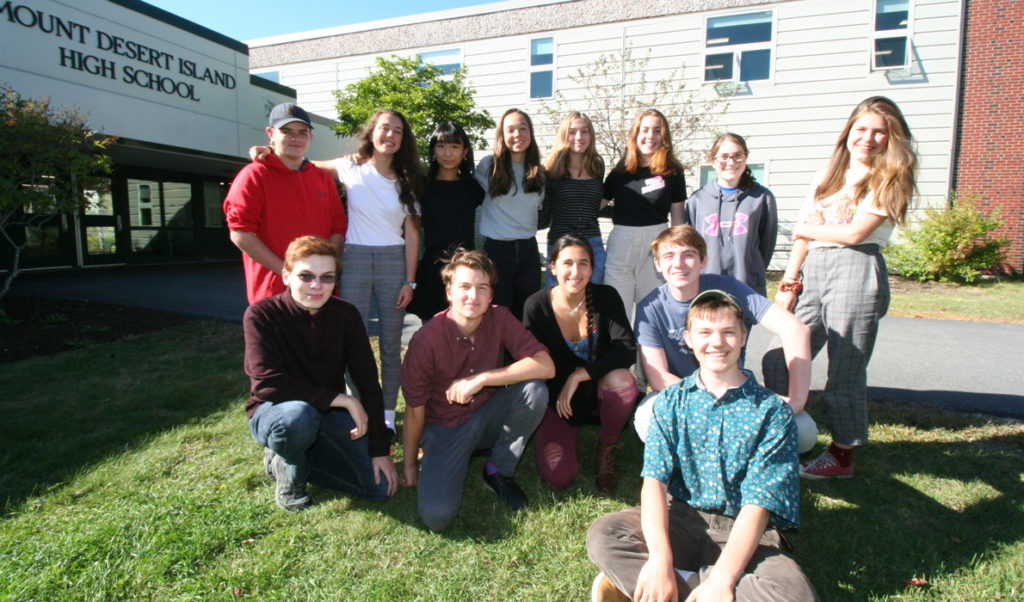By Laurie Schreiber
A group of Mount Desert Island High School students, with faculty advisor Ruth Poland, are tackling climate change and sustainability issues as the school’s Eco Team. Among many projects, the group helped organize and participated in climate strikes and assisted plans for the school’s solarization. Ongoing initiatives include implementation of composting, recycling, and zero-waste programs; education and fundraising for school and community sustainability solutions; and collaboration with college and community groups.
The Working Waterfront asked two leaders to speak to youth’s role in the climate movement. Sofie Dowling and Thomas Korstanje are seniors; Korstanje is an intern with A Climate To Thrive.
The Working Waterfront: What’s driving youth to climate activism?
Thomas Korstanje: A lot of younger people see what the “new normal” will be and want to change that. I don’t think there’s a single person who wants to live in a world where catastrophic change is “normal.” We want there to be a good normal—a normal where we don’t have to put on a gas mask, where we can still take a walk on a summer day and not have to be inside because of poor air quality.
Sofie Dowling: I’m at the stage of my life where everyone asks where I’m going to go to college, what am I going to be when I grow up. I don’t know yet. But I’d like to have the choice to be many things. But I won’t have that in a beautiful place with air that I can breathe, and a house on an island that I can live in, if something doesn’t change.
TWW: There’s a new term—“eco anxiety.” Does this affect you?
TK: I see too much hope to be anxious. I see the momentum, the light in people’s eyes saying, “We can do this.” I think I can make a difference and I see what I need to do, so it’s not something I’m anxious about.
Instead of making this daunting problem a source of anxiety, it becomes a drive for me. I know that’s easier said than done. But if you’re someone who’s anxious about it, try to turn it into a drive.
SD: I can see why people would be anxious about it. It’s a good thing to be anxious about. But instead of worrying about it, we can start changing how we do things. There’s no time to be anxious. That sounds callous, but there’s not enough time for us to be sitting and worrying. There’s only time for progress and solutions and continuation of our fight for the climate and for our future and for ideas.
TWW: How can youth drive action?
TK: A lot of people think the little things don’t matter: “If I throw away this plastic fork, what difference does one fork make?” We have to change our routines. It’s about changing little things, but doing it in a sustainable way. We can call our representatives and show up at the state house.
SD: We can talk with our friends and show them how change is working for us. We need to have the right information and it’s good to have solutions to present, instead of just saying, “Wow, isn’t’ this horrible?” We can say, “Isn’t this horrible? But here’s what we can do.” We’re also hoping for a change in the mindset and not one that takes new routines as an inconvenience but as a new way of life.
TWW: Are students here receptive to these ideas?
TK: There’s a pretty big group of people who are aware of the issues and doing something about it. We’re hoping to make that group bigger. A lot of people think, “It’s too much for me. It’s not something that will affect me where I am.” We want to educate people.
SD: We as the Eco Team need to educate not only around solutions, but also around how this is affecting people we don’t hear about every day, around the social issues of climate change.
TK: We live on a perfect little island. We don’t see the effects on urban settings or huge group settings. We want to look at that more. If you look at the climate strikes and the amount of pressure that youth and adults are putting on politicians, it’s amazing to see how much power we have.
The hopeful part of me thinks everything is going to be fine. The realistic part of me says, “We’re going to make a huge dent, but we’re not going to make the deadlines and we’re going to have to come up with alternatives to live in a new world.”





